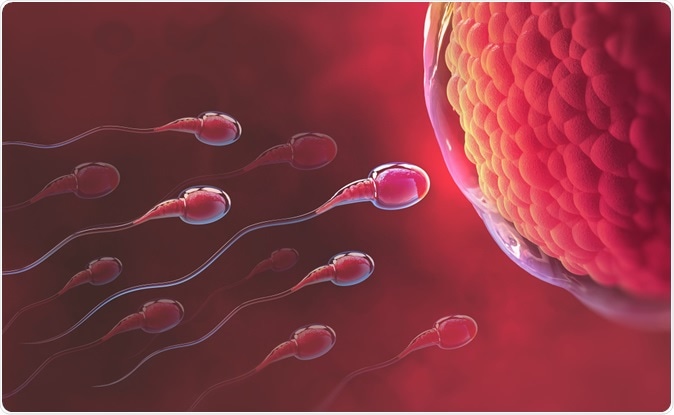Scientists at the Imperial College in London have found that one of the reasons behind frequent miscarriages in a woman could be the fault of the sperms of their partners. Recurrent miscarriages are defined as three or more miscarriages that occur before 20 weeks of pregnancy are completed. One in 50 couples in the UK are affected by recurrent miscarriages.
The results of this small but significant study titled, 'Reduced Testicular Steroidogenesis and Increased Semen Oxidative Stress in Male Partners as Novel Markers of Recurrent Miscarriage', were published in the latest issue of the journal Clinical Chemistry.

Sperm and egg cell illustration. Image Credit: Yurchanka Siarhei / Shutterstock
For this study the team looked at the sperm quality of around 50 men whose partners had been struggling to carry a pregnancy to term but had suffered from at least three miscarriages. They also collected healthy sperm from 60 other volunteers whose partners were successful in completing their pregnancies. On comparing the two groups they noted that the men whose partners were suffering from miscarriages had twice as much damaged to their sperm DNA compared to the healthy group.
Lead author Dr Channa Jayasena from the Department of Medicine said, “Traditionally doctors have focused attention on women when looking for the causes of recurrent miscarriage. The men's health - and the health of their sperm - wasn't analysed. For instance, previous research suggests sperm has an important role in the formation of the placenta, which is crucial for oxygen and nutrient supply to the foetus.”
The team noted that the DNA damage within the sperm was caused by reactive oxygen species or free radicals that are formed within the semen. These oxidative species protect against bacteria but can in turn damage the DNA of the sperm. This study showed that the partners of women who had miscarriages had four times higher reactive oxygen species in their semen compared to the healthy control group. They speculate that the reason behind this phenomenon could be previous infections. Being obese and higher male age could also be a reason behind oxidative damage to the sperms, the authors of the study explain.
However as a limitation to the study, the average age of the men whose partners suffered miscarriages was 37 years compared to 30 years among the healthy control men. Further the men in the miscarriage group were a little more overweight compared to the healthy men.
Dr Jayasena said in a statement, “Although none of the men in the trial had any ongoing infection it is possible there may be other bacteria from previous infections lingering in the prostate gland, which makes semen. This may lead to permanently high levels of reactive oxygen species. It has taken medicine a long time to realise sperm health has a role to play in miscarriage - and that the cause doesn't lie solely with women. Now we realise both partners contribute to recurrent miscarriage we can hopefully get a clearer picture of the problem and start to look for ways of ensuring more pregnancies result in a healthy baby.”
Dr Kevin McEleny of the British Fertility Society in a statement added, “This is an interesting study that illustrates the importance of research into sperm quality. The results agree with some of the previous research into a link between DNA damage in sperm and miscarriage. We know that the partners of older men are more likely to suffer miscarriage. The study group was generally older than the control group, which might go some way to explain the results.”